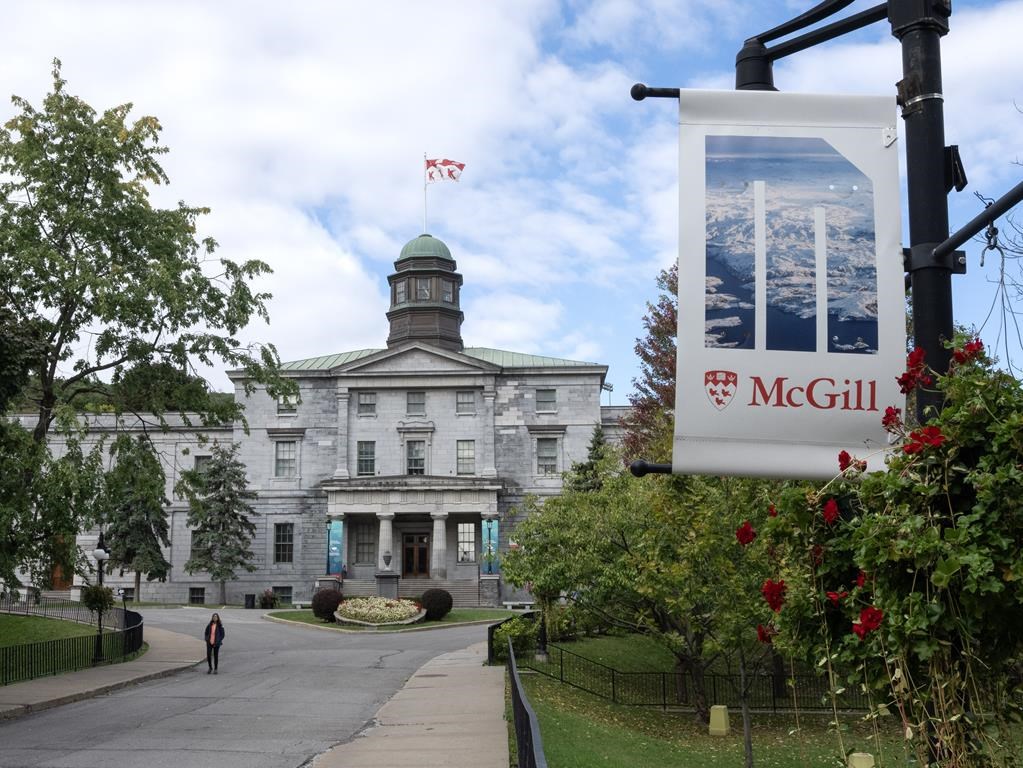Quebec tuition hike: McGill says it could cost $94M, cut enrolment and jobs

Posted November 3, 2023 10:19 am.
Last Updated November 3, 2023 4:01 pm.
Quebec’s tuition hikes for new out-of-province students are expected to have “devastating consequences” for McGill University.
A major drop in the number of students enrolled, a revenue loss of up to $94 million and up to 700 job cuts are some of the impacts McGill says it’s facing.
The CAQ government’s measures announced on Oct. 13 including an increase in tuition fees for Canadian students from outside Quebec from $8,992 to $17,000, and a minimum of $20,000 for international students starting in the fall of 2024.
The government says this is a way to promote the use of the French language and bolster francophone universities by re-investing the money to their programs.
If Implemented, McGill says the measures will have “profound and far-reaching consequences.”
In an internal statement to the McGill Community, Deep Saini, Principal and Vice-Chancellor, McGill University said since the province’s announcement, they have been analyzing their potential impacts on McGill.
It follows similarly bleak prognoses from Quebec’s two other English-language universities, Bishop’s and Concordia. The three schools count a higher number of out-of-province students than their francophone counterparts.
Concordia president Graham Carr claimed the new $17,000 tuition for non-Quebec Canadian students, among the highest rates in the country, will price the school out of the domestic market, potentially gutting out-of-province undergraduate registration by up to 90 per cent.
“The measures the Government announced threaten to change our culture as they will create a shift in the make-up of our student body, and in the experience that our students have on our campuses,” Saini said. “I want to assure you that McGill remains committed to working with the Government of Quebec to find more effective ways to help it achieve its goals of promoting and protecting the French language while reinvigorating Quebec’s university system.”
Saini detailed the expected impacts after conducting an analysis:
Enrolment: “Many Canadian students from outside Quebec will likely not come to McGill because their tuition in 2024 for comparable programs will be much higher than in universities elsewhere in Canada,” the statement says. McGill says they are working to recruit a greater number of prospective students from Quebec or from countries around the world to fill the places normally taken by students from the rest of Canada. “In the best-case scenario, we will fill no more than 80 per cent of these spaces, and in the worst-case scenario, we will fill no more than 20 per cent, thereby reducing the number of students coming to McGill.”
Revenue: The potential overall revenue loss in tuition fees will range from $42 million to $94 million annually. With respect to international student tuition fees, the loss will be $24.5 million. They estimate a loss of at least 20 per cent of those students, and up to 80 per cent, which translates into an annual loss of between $17.6 million and $69.8 million.
Faculties: The consequences will be “especially devastating” for the Schulich School of Music, which has an undergraduate student population composed of almost 40 per cent from the rest of Canada. The new tuition fee will likely be cost-prohibitive for new students and will place the School in jeopardy. The Faculty of Agricultural and Environmental Sciences, the Faculty of Education and the B.A. & Sc. interfaculty programs will also be severely affected.
Jobs: McGill says it will implement some measures including a hiring freeze, job reductions that could reach between 650 and 700, a deferral of planned expenditures and additional non-salary reductions in expenditures.
Infrastructure: The projected revenue loss will reduce McGill’s borrowing limit and capacity to service debt. These increased costs may force McGill to suspend some infrastructure projects.
Sports: McGill may have to suspend or cut some McGill Redbirds and Martlets teams, since a third of the student-athletes are from out-of-province.
Saini says Quebec needs a network of vibrant universities. “Each institution brings a unique value to society, has its own identity and plays a distinct role to strengthen Quebec. We need all our universities to be strong for the economy to grow, to give us the means to promote French, to protect our culture and to maintain our enviable quality of life. ”
Quebec government officials have been open about their intent to curb the number of anglophone Canadian students in the province, a population that Premier Francois Legault has qualified as a threat to the French language. Though, Legault said this week he was willing to meet with the leaders of the three universities to hear suggestions for alternative measures to achieve that goal.
“The uncertainty of the past few weeks only strengthens my resolve to ensure that McGill remains one of the world’s best universities, an institution that welcomes top students from every region of Quebec, from across Canada and from around the world. ”








